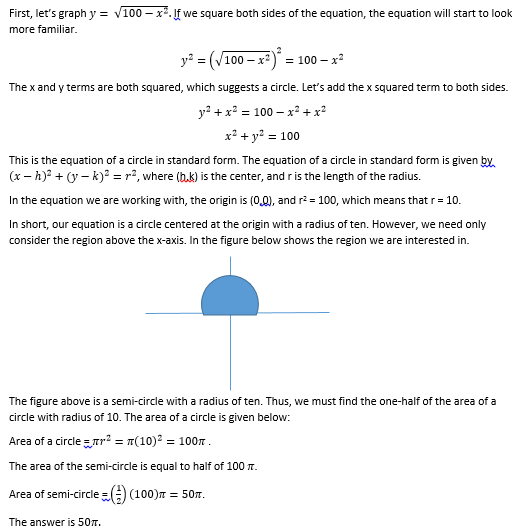Plane Geometry
Help Questions
Math › Plane Geometry
In order to get to work, Jeff leaves home and drives 4 miles due north, then 3 miles due east, followed by 6 miles due north and, finally, 7 miles due east. What is the straight line distance from Jeff’s work to his home?
2√5
11
10√2
15
6√2
Explanation
Jeff drives a total of 10 miles north and 10 miles east. Using the Pythagorean theorem (a2+b2=c2), the direct route from Jeff’s home to his work can be calculated. 102+102=c2. 200=c2. √200=c. √100√2=c. 10√2=c
What is the hypotenuse of a right triangle with side lengths 

Explanation
The Pythagorean Theorem states that . This question gives us the values of



Take 



Now we can start solving for 
The length of the hypotenuse is 
What is the height of an equilateral triangle with side 6?
Explanation
When you draw the height in an equilateral triangle, it makes two 30-60-90 triangles. Because of that relationship, the height (which is across from the 

To the nearest tenth, give the area of a circle with diameter 
Explanation
The radius of a circle with diameter 

In order to get to work, Jeff leaves home and drives 4 miles due north, then 3 miles due east, followed by 6 miles due north and, finally, 7 miles due east. What is the straight line distance from Jeff’s work to his home?
2√5
11
10√2
15
6√2
Explanation
Jeff drives a total of 10 miles north and 10 miles east. Using the Pythagorean theorem (a2+b2=c2), the direct route from Jeff’s home to his work can be calculated. 102+102=c2. 200=c2. √200=c. √100√2=c. 10√2=c
To the nearest tenth, give the area of a circle with diameter 
Explanation
The radius of a circle with diameter 

100_π_
50_π_
25_π_
10_π_
20_π_
Explanation
100_π_
50_π_
25_π_
10_π_
20_π_
Explanation
What is the hypotenuse of a right triangle with side lengths 

Explanation
The Pythagorean Theorem states that . This question gives us the values of



Take 



Now we can start solving for 
The length of the hypotenuse is 
This figure is a regular hexagon with one side measuring 6 cm.
What is the perimeter of the regular hexagon in centimeters?
Explanation
The perimeter of a regular hexagon is just the sum of all 6 sides. Because it's a regular hexagon, the perimemter is just six times one side (6 cm) or 36 cm.



























